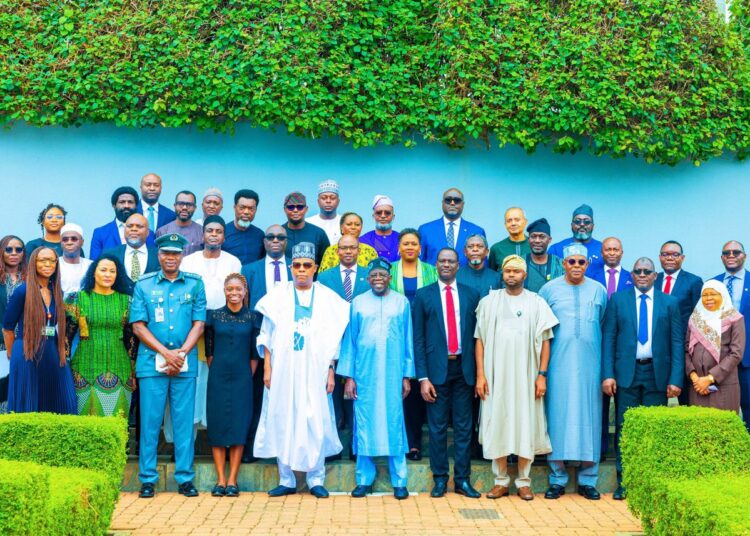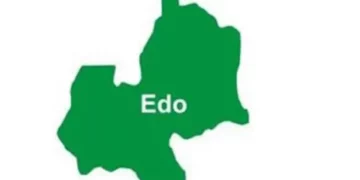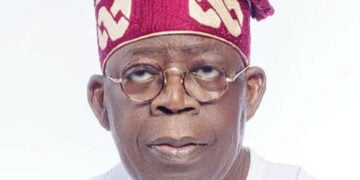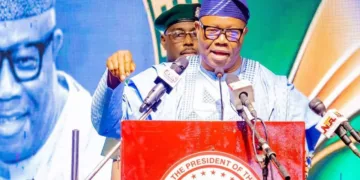President Bola Tinubu, on Tuesday, in Abuja expressed his resolute commitment to break the vicious cycle of overreliance on borrowing for public spending, and the resulting burden of debt servicing it places on the management of Nigeria’s limited government revenues.
Inaugurating the Presidential Committee on Fiscal Policy and Tax Reforms, chaired by Mr. Taiwo Oyedele, the President charged the committee to improve the country’s revenue profile and business environment as the Federal Government moves to achieve an 18% Tax-to-GDP ratio within three years.
The President directed the Committee to achieve its one-year mandate, which is divided into three main areas: fiscal governance, tax reforms, and growth facilitation.
He also directed all government ministries and departments to cooperate fully with the committee towards achieving their mandate.
In a statement by Presidential spokesman, Ajuri Ngelale, President Tinubu told the Committee members the significance of their assignment, as his administration carries the burden of expectations from citizens who want their government to make their lives better.
“We cannot blame the people for expecting much from us. To whom much is given, much is expected.
”It is even more so when we campaigned on a promise of a better country anchored on our Renewed Hope Agenda. I have committed myself to use every minute I spend in this office to work to improve the quality of life of our people,” he declared.
Acknowledging Nigeria’s current international standing in the tax sector, the President said the nation is still facing challenges in areas such as ease of tax payment and its Tax-to-GDP ratio, which lags behind even Africa’s Continental average.
“Our aim is to transform the tax system to support sustainable development while achieving a minimum of 18% tax-to-GDP ratio within the next three years.
”Without revenue, government cannot provide adequate social services to the people it is entrusted to serve.
”The Committee, in the first instance, is expected to deliver a schedule of quick reforms that can be implemented within thirty days. Critical reform measures should be recommended within six months, and full implementation will take place within one calendar year,” the President directed.
Recounting the President’s sterling track record on revenue transformation, the Special Adviser to the President on Revenue, Mr. Zacchaeus Adedeji described the committee members, drawn from the public and private sectors, as accomplished individuals from various sectors.
”Mr. President, you have the pedigree when it comes to revenue transformation. You demonstrated this when you were the Governor of Lagos State over 20 years ago,” the Special Adviser said.
Chairman of the Committee, Mr. Taiwo Oyedele pledged the total commitment of members to give their best in the interest of the nation.
“Many of our existing laws are out-dated, hence they require comprehensive updates to achieve full harmonisation to address the multiplicity of taxes, and to remove the burden on the poor and vulnerable while addressing the concerns of all investors, big and small,” he said.
Also speaking to State House correspondents after the inauguration,Ayodele emphasized that the objective is not to burden citizens with additional taxes but to ensure a fair and efficient collection system.
The committee acknowledged that untapped revenue potential lies within the existing tax framework, with an estimated shortfall of around 20 trillion naira ($48 billion USD).
Addressing inefficiencies in revenue collection is a key focus, and to that end, he said the committee suggested entrusting the Federal Inland Revenue Service (FIRS) with the collection of revenues from multiple agencies, allowing them to prioritize their core mandates and accelerate economic growth.
He said the proposal also seeks to increase the tax-to-GDP ratio by 18%, a move Ayodele believes can be achieved through careful policy design and data-driven decision-making.
Recognizing the delicate balance between taxing consumption and maintaining citizens’ quality of life, Ayodele highlighted the importance of exempting essential goods from Value Added Tax (VAT) to shield the poor and vulnerable from undue financial strain.
Underpinning this reform is the committee’s commitment to using data to craft a progressive fiscal policy.
Ayodele explained that this approach is aimed at ensuring those who can afford to contribute more do so, while safeguarding the interests of those with limited means.
On his part, the Country Director at the World Bank, Shubham Chaudhuri, shed light on the country’s need to boost government revenues while optimizing spending to meet essential needs.
Speaking about the significance of government revenues relative to GDP, Chaudhuri clarified that the focus extends beyond taxes alone, encompassing non-tax revenues as well.
Chaudhuri applauded President’s decisive action on his first day in office, applauding the elimination of fuel subsidies, which translated to a substantial increase in government revenues—approximately two percentage points of GDP.
This move countered the hefty annual loss of around 10 trillion naira ($24 billion USD) due to subsidy payments.
The discussion shifted to Nigeria’s fiscal policy and the critical role it plays in delivering fundamental services such as law enforcement, healthcare, education, electricity access, and infrastructure.
Chaudhuri provided a rule of thumb that typically dictates that governments allocate between 15 to 20% of GDP to meet these core needs.
However, over the past decade, Nigeria has been allocating only 10 to 12% of GDP, resulting in a widening gap between revenue and expenditure.
Chaudhuri’s insights revealed that Nigeria’s current revenues of 7 to 8% of GDP fall significantly short of meeting the basic needs of its populace.
Highlighting the president’s vision for human capital investment and youth empowerment, Chaudhuri emphasized the importance of raising revenues beyond the 15% threshold.
He said the current target of 18% aims to steer Nigeria toward sustainable growth.
Comparing Nigeria’s revenue-to-GDP ratio with other middle-income countries like India and Indonesia, Chaudhuri noted that achieving 15 to 20% is an attainable goal.
Acknowledging the progress in dismantling fuel subsidy, Chaudhuri endorsed Chairman Taiwo’s perspective on narrowing the tax gap and optimizing collection efficiency.
He said one of the primary avenues for revenue enhancement is tax administration reform.
Chaudhuri noted that a substantial number of eligible taxpayers do not contribute adequately, while tax expenditures and collection costs need scrutiny.
He said harmonising taxes and gradually fine-tuning the policy framework emerged as a strategic approach.











